
ATLANTIC ECONOMIC JOURNAL
Scope & Guideline
Fostering Critical Conversations in Economics
Introduction
Aims and Scopes
- Applied Economic Research:
The journal publishes empirical studies that apply economic theories to real-world scenarios, providing insights into various sectors such as technology, finance, and public policy. - Interdisciplinary Approaches:
ATLANTIC ECONOMIC JOURNAL encourages interdisciplinary research that integrates economics with other fields, such as sociology, psychology, and political science, to address complex societal issues. - Policy Analysis and Evaluation:
The journal emphasizes the importance of research that evaluates and analyzes the implications of economic policies, offering evidence-based recommendations for policymakers. - Market Dynamics and Behavioral Economics:
There is a focus on understanding market behavior and dynamics, including consumer behavior, firm strategies, and the impact of external factors on economic performance. - Global and Regional Economic Issues:
The journal explores both global and regional economic trends, providing analyses that are relevant to international trade, investment, and economic development.
Trending and Emerging
- Impact of Technology on Economics:
There is an increasing emphasis on how technological advancements, such as digital currencies and data analytics, are reshaping economic frameworks and practices. - Behavioral Economics and Decision Making:
Research exploring the psychological factors influencing economic decisions, such as risk-taking behavior and consumer preferences, is gaining traction, highlighting the importance of behavioral insights in economic analysis. - Sustainability and Climate Economics:
Emerging themes related to the economic impacts of climate change, sustainability practices, and environmental policies are becoming more prominent, reflecting a growing recognition of these issues in economic discourse. - Health Economics and Policy:
The journal is increasingly publishing studies that analyze the economic aspects of health care systems, particularly in light of recent global health crises, emphasizing the intersection of health and economic policy. - International Trade Dynamics:
Research focusing on the changing patterns of international trade, including the effects of geopolitical shifts and trade policies, is on the rise, indicating a renewed interest in global economic interactions.
Declining or Waning
- Historical Economic Analysis:
Research focused on historical economic events or theories has decreased, reflecting a shift towards more contemporary and applied economic issues relevant to current global challenges. - Theoretical Frameworks without Empirical Support:
There is a noticeable decline in the publication of papers that primarily discuss theoretical frameworks without robust empirical evidence, suggesting a preference for studies that provide actionable insights. - Sector-Specific Studies:
While sector-specific studies were once prevalent, there seems to be a waning interest in isolated analyses of particular industries, moving instead towards more integrated and cross-sectoral approaches. - Macroeconomic Stability Discussions:
Themes centered around traditional macroeconomic stability and growth models are becoming less frequent, possibly due to the evolving landscape of economic challenges that require new frameworks and methodologies.
Similar Journals
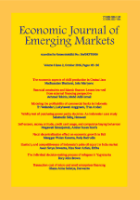
Economic Journal of Emerging Markets
Navigating the Future of Economic DevelopmentEconomic Journal of Emerging Markets, published by UNIV ISLAM INDONESIA, serves as a pivotal platform for scholars and practitioners focused on the dynamic landscape of emerging economies. With an ISSN of 2086-3128 and an E-ISSN of 2502-180X, this Open Access journal has been dedicated to disseminating high-quality research since 2009, making it accessible to a global audience interested in economic development, policy analysis, and market dynamics. Situated in Yogyakarta, Indonesia, the journal emphasizes innovative research and empirical studies that contribute to the understanding of economic issues faced by emerging markets. Although specific H-index and quartile rankings are pending, the journal aims to establish a strong academic presence and foster interdisciplinary collaborations among researchers, professionals, and students alike, addressing critical economic challenges and opportunities.
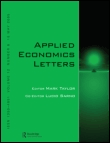
APPLIED ECONOMICS LETTERS
Empowering scholars with impactful economic insights.Applied Economics Letters, published by Routledge Journals, Taylor & Francis Ltd, stands as a scholarly platform dedicated to the rapid dissemination of innovative research in the field of economics and econometrics. The journal, with ISSN 1350-4851 and E-ISSN 1466-4291, has been serving the academic community since 1994, and continues to thrive as it approaches its 30th anniversary in 2024. With a commendable position within the Q3 category in its field, it ranks #315 out of 716 journals in Scopus, signifying its impact within the percentile of 56th. Although it operates on a subscription basis, the journal's objective remains clear: to publish concise and substantive letters that contribute significantly to the discourse on applied economic issues, thereby providing valuable insights for researchers, professionals, and students alike. Applied Economics Letters is committed to addressing emerging trends and pressing economic challenges, making it an essential resource for anyone engaged in the dynamic world of economic inquiry.
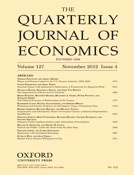
QUARTERLY JOURNAL OF ECONOMICS
Exploring the Frontiers of Economic KnowledgeQUARTERLY JOURNAL OF ECONOMICS is a prestigious and long-established academic journal published by Oxford University Press Inc. With its origins dating back to 1886, this esteemed journal has continually provided a vital platform for the dissemination of cutting-edge research in the field of economics and econometrics. The journal holds an impressive Q1 ranking in the Economics and Econometrics category, positioning it at the forefront of scholarly contribution with a Scopus rank of #2 out of 716, reflecting its standing in the top 1% of the field. Although the journal is not open access, it offers a wealth of vital resources and insights that are indispensable for researchers, professionals, and students alike, as it aims to advance knowledge and influence economic policy and practice through rigorous academic inquiry.

Economia-Journal of the Latin American and Caribbean Economic Association
Exploring New Frontiers in Latin American and Caribbean EconomiesEconomia - Journal of the Latin American and Caribbean Economic Association, published by LSE Press, serves as a vital platform for the dissemination of economic research pertinent to the Latin American and Caribbean regions. Since its inception in 1977, this Open Access journal has embraced an inclusive approach, ensuring that valuable insights are readily accessible to a global audience. With an ISSN of 1533-6239, Economia aims to highlight issues related to economic development, policy analysis, and international economics, making significant contributions to the fields of economics, political science, and international relations. It currently ranks in the Q4 category across several related fields, reflecting its emerging status in the academic discourse. The journal's commitment to fostering interdisciplinary dialogue is evident through its annual publications, making it an essential resource for researchers, professionals, and students eager to engage with contemporary economic challenges and innovations in the region.

Economics and Business Review
Bridging theory and practice in the world of finance and business.Economics and Business Review is a prominent open-access journal dedicated to advancing knowledge in the fields of business, economics, and finance. Published by SCIENDO, this journal aims to provide a platform for innovative research and critical discourse, fostering collaboration among scholars, practitioners, and students alike. With its ISSN 2392-1641 and E-ISSN 2450-0097, Economics and Business Review has established itself within the academic community since becoming open access in 2018. Based in Poland, the journal covers a wide range of topics within its converged years (2019-2024) and has achieved a Q3 category ranking in various disciplines, including Business and International Management, Economics and Econometrics, and Finance as of 2023. These accolades underscore its growing influence, as evidenced by its Scopus rankings, which place it among the notable contributors in these domains. The journal's commitment to accessibility and scholarly rigor ensures it is a vital resource for researchers and professionals striving to remain at the forefront of economic and business trends.
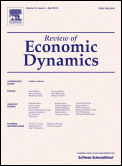
REVIEW OF ECONOMIC DYNAMICS
Advancing the Frontiers of Economic UnderstandingREVIEW OF ECONOMIC DYNAMICS, published by Academic Press Inc, Elsevier Science, is a leading academic journal in the field of economics and econometrics, holding a distinguished Q1 ranking in its category as of 2023. With an impactful focus on the theoretical and empirical analysis of dynamic economic systems, the journal seeks to advance our understanding of economic dynamics through innovative research that addresses contemporary issues and policy implications. The journal boasts a significant history of contributions from renowned scholars since its inception in 1998, and will continue to publish through 2025. Although it does not currently offer open access options, the journal serves as a crucial resource for researchers, professionals, and students who are keen to explore and engage with the latest findings in economic theory and practice. With a current Scopus rank of #280 out of 716 in the Economics and Econometrics category, the REVIEW OF ECONOMIC DYNAMICS remains an invaluable platform for scholarly discussion and insight into the complexities of economic behavior.

Panoeconomicus
Shaping Insights in Economics, Econometrics, and FinancePanoeconomicus is a renowned academic journal published by SAVEZ EKONOMISTA VOJVODINE, specializing in the evolving fields of Economics, Econometrics, and Finance. Since its inception as an Open Access publication in 2006, this journal has fostered a collaborative environment for scholars and practitioners to disseminate research that contributes to critical economic discourses. Based in Serbia, and operating within an international context, Panoeconomicus carries an impressive Scopus Rank in the 57th percentile, further reflected in its Q3 category quartile for Economics, Econometrics, and Finance as of 2023. With a commitment to enhancing academic dialogue through readily accessible content, the journal is instrumental in shaping new insights and methodologies available to researchers, finance professionals, and students alike. Its significance in the field continues to grow, particularly as it addresses pressing economic challenges from 2009 to 2024 and beyond, making it a valuable resource for those aiming to stay at the forefront of economic research.
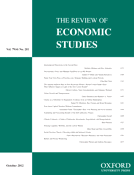
REVIEW OF ECONOMIC STUDIES
Pioneering Scholarly Excellence in Economics Since 1933REVIEW OF ECONOMIC STUDIES, published by OXFORD UNIVERSITY PRESS, stands as a premier academic journal in the field of Economics and Econometrics. Established in 1933, it has maintained a strong tradition of scholarly excellence, evidenced by its prestigious Q1 category ranking and its position in the top 93rd percentile among its peers, with a remarkable Scopus rank of #49 out of 716 related journals. This reputable journal aims to publish high-quality research that advances theoretical understanding and empirical knowledge in economics, fostering a dynamic dialogue among researchers, professionals, and students alike. Despite not being an open access journal, the REVIEW OF ECONOMIC STUDIES provides invaluable insights and impactful findings that shape the discourse in the economics community, making it a vital resource for those engaging in rigorous economic analysis and policy-making.
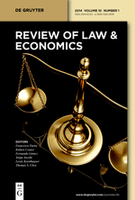
Review of Law & Economics
Connecting Legal Theory with Economic Practice.Review of Law & Economics, published by WALTER DE GRUYTER GMBH, serves as a pivotal platform in the intersecting realms of law and economics, with its open access policy initiated in 2016 to promote wider dissemination of research. Based in Germany, this journal aims to foster insightful discussions and innovative research that bridge the gap between legal frameworks and economic principles. With an impact factor reflected in its Q2 rank in Law and Q3 rank in Economics, Econometrics and Finance as per the 2023 category quartiles, it positions itself as a significant contributor to scholarly works in both fields. The journal's unique approach highlights a comprehensive analysis of legal issues through an economic lens, making it invaluable for researchers, professionals, and students alike. As it encompasses a broad spectrum of topics from regulatory analysis to market dynamics, the *Review of Law & Economics* continues to be a vital resource for those seeking to enhance their understanding and application of law in economic contexts, with converged years extending from 2005 to 2024.
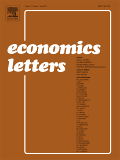
ECONOMICS LETTERS
Fostering concise communication for a dynamic economic landscape.ECONOMICS LETTERS is a prestigious academic journal published by Elsevier Science SA, based in the Netherlands. Established in 1978, this journal seeks to provide rapid dissemination of concise and impactful research in the fields of Economics and Finance, making it an essential resource for scholars and practitioners alike. With its Q2 ranking in both Economics and Econometrics and Finance categories as of 2023, it reflects a solid standing in the global academic community, facilitating a vibrant dialogue among researchers. Although open access options are not available, the journal ensures accessibility through institutional subscriptions, thereby reaching a diverse audience. By fostering clarity and brevity in economic communication, ECONOMICS LETTERS serves not only to advance theoretical understanding but also to influence practical policymaking, making it a vital asset for those engaged in the economic sciences.